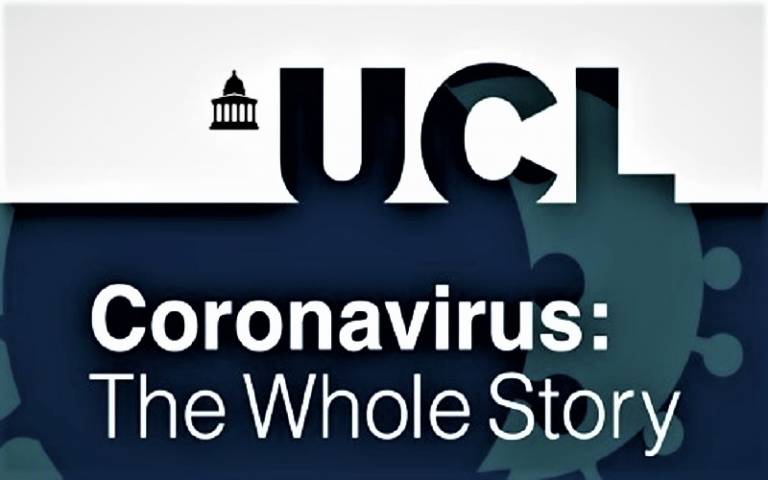A student reviews... Coronavirus: The Whole Story
3 July 2020
Have you tuned into UCL's weekly coronavirus podcast yet? Get the run-down of what to expect – and look out for – in this review by UCL Student Journalist Eamonn Lynch-Bowers.

In these uncertain times, it is sometimes all too easy to feel overwhelmed by events. Coronavirus has changed the way we live our lives – perhaps irreversibly – in just a matter of months, and in many ways its immediate medical implications are only the tip of the iceberg. The pandemic has precipitated social, economic, and political knock-on effects, the scale of which may take years to become fully apparent. In Coronavirus: The Whole Story, a new podcast series from UCL Minds, host Vivienne Parry begins to examine these issues by drawing together academic expertise from the full breadth of the university’s latest research in an effort to understand how coronavirus has changed our world.
With daily life interrupted almost universally, mental health has become a particular focus in recent times. In episode six, Parry is joined by UCL academics Dr Daisy Fancourt, Dr Jo Billings, and Dr Rochelle Burgess to discuss the implications of coronavirus for emotional wellbeing. New data from Dr Fancourt’s COVID-19 social study, for example, suggests that poor mental health correlates not only with fear of exposure to the virus. While the elderly are understandably more worried of contracting the disease, on average they have seen much less disruption in their day-to-day lives, many having already retired. For younger people, by contrast, while exposure to the virus is much less likely to be fatal, the closure of schools and universities has changed circumstances dramatically, which has had an appreciable impact on stress levels. Helpfully though, the three experts also offer their listeners some tips on managing their own mental health, which include finding a purpose in lockdown, even if it’s just in smaller tasks, and being kind to ourselves during this turbulent period.
In another episode, The Whole Story examines the current medical means available for fighting the virus, a field that has advanced at lightning speed since the initial outbreak. In the course of the discussion between Professor Suzanne Farid, Dr Richard Angell, Professor Francois Balloux, and Professor Judith Breuer, we learn that ultimately, coronavirus is probably here to stay, but that does not mean that returning to (a semblance of) normality is entirely out of reach. As the months tick by, our understanding of COVID-19 will continue to advance exponentially, improving our ability to test, trace, and treat the virus.
For example, Professor Farid explains that we may well be able to modify ‘point of care’ tests, such that they become less invasive, which would surely be a welcome step forward if these tests are to be rolled out more widely. Meanwhile, in other good news, Professor Francois reports that he has not yet seen signs that COVID-19 is mutating such that it would become more dangerous to its hosts, and Dr Angell outlines the promise shown by existing anti-viral drugs that can be ‘re-purposed’ to fight this novel coronavirus.
A recent instalment sees Parry being joined by three creatives – civil engineer Professor Nick Tyler, material scientist Professor Mark Miodownik, and artist Dr Gregory Thomson – to predict how the world might develop as it learns to live alongside coronavirus. Will social distancing really mean a permanent change to the way we socialise? Intriguingly, the episode raises the possibility of adaptations in the way we speak or even in the built environment as the nature of our interactions begins to evolve. For sure, a more immediate-term change will be the wider popularity of face coverings, but as Professor Miodownik explains, becoming accustomed to these new accessories may well prove more complicated than we first imagined.
Coronavirus: The Whole Story is a fantastically accessible podcast that takes on very technical topics in a tone that is refreshingly clear and to-the-point. Its host shows great skill in probing for the most intriguing responses from her expert guests, and the broad variety of issues covered allows for a pacey style that goes right to the heart of the pandemic’s thorniest questions.
The first 11 episodes of Coronavirus: The Whole Story are available now – find out more here.
By Eamonn Lynch-Bowers
 Close
Close

